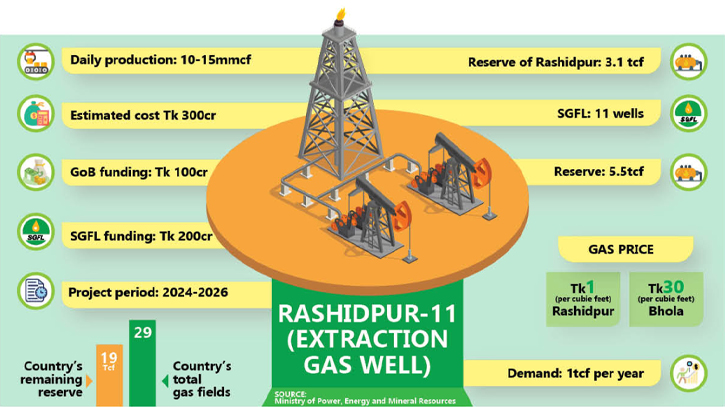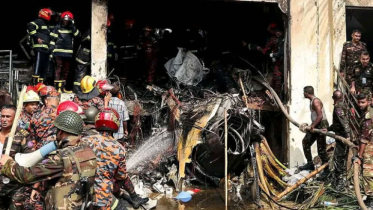
Photo: Messenger
The government is gearing up to prioritise the extraction of domestic gas after a decade – driven by the challenges posed by mounting bills for the import of costly liquefied natural gas (LNG).
Upon facing disorientation currently due to the financial pressures associated with LNG imports, the government is taking such proactive step at long last.
The Ministry of Power, Energy and Mineral Resources has projected a budget of Tk 272.63 crore for the development of Rashidpur-11 exploration well under Sylhet Gas Field Limited (SGFL).
This strategic initiative is aimed at making the well operational and ready to contribute to the national grid's gas supply by the year 2026.
Of the projected funds, the government is set to allocate Tk 93.22 crore, with the remaining Tk 179.41 crore to be financed by SGFL. As outlined by the Energy Division, the initiation of the projects is scheduled for January 2024, with a targeted completion date set for December 2025.
When asked, State Minister for Power, Energy and Mineral Resources Nasrul Hamid told The Daily Messenger, “We are always aware of the domestic resources. Whenever we feel the necessity of local gas, we will have a drive for the gas. But we have to think about the future as well.”
The concerned ministry on November 23 issued instructions to the SGFL – thereby directing them to initiate the Direct Purchase Procedure (DPP) promptly for the timely implementation of the project.
The Divisional Project Evaluation Committee (DPEC) meeting of the Energy Division on September 9 decided to implement the project on an emergency basis.
While talking to The Daily Messenger, SGFL Managing Director Mizanur Rahman said, “We are taking up the project of digging Rashidpur-11 exploration well in the new year. To overcome the ongoing gas crisis, the government has taken initiatives to increase production from domestic gas fields. If everything goes well, 10 to 15 million cubic feet of gas can be extracted daily from this well.”
He emphasised that due to the project's critical significance in addressing the immediate demand for gas, the Finance Division has granted approval for disbursing the funds on time, even in the absence of a budget allocation in the fiscal year 2023-24.
At present, the national grid receives a supply of 44 million cubic feet of gas from five operational wells in the Rashidpur gas field—specifically, wells numbered 1, 3, 4, 7, and 8. However, wells 2 and 5 are currently inactive. In response, Sylhet Gas Field Limited has devised a plan to re-open these closed wells through a workover process.
The gas production of Rashidpur-9 has been suspended due to objection of the Forest Department regarding cutting of the trees but in the crisis situation this gas would play an important role in supply of fuel to the power plants.
As much as 675 billion cubic feet of gas has been extracted from reserves of 3.1 trillion cubic feet in Rashidpur.
A letter dated February 12 of this year was issued seeking permission to cut down forests for laying the pipeline. According to the letter, the Forest Department formed a committee to address this matter, and they have submitted a report. However, as of now, the resolution of this matter is still pending or has not been finalised.
The new Secretary of the Energy Division Nurul Alam took the matter seriously. Recently, he talked to the secretary of the Forest Department over the phone. Ministry sources have confirmed that the matter has been urged to be resolved quickly.
The concerned parties have stated that the Rashidpur-9 gas well was drilled in 2017. This well has the capacity to extract between 14 to 19 million cubic meters of gas daily. However, due to the absence of a mere 5 km pipeline, the gas from this well has remained untapped and has not been integrated into the grid for the past five years. But it is possible to install a pipeline within 2-3 months that can transmit the gas to the national grid. Unfortunately, the gas is neglected.
Petrobangla has recently signed an agreement with Intraco Refueling Limited. The company will transport the gas from Bhola and supply it to the western areas of Dhaka. Intraco will have to pay Tk 30.60 per cubic meter of gas while industrial plants pay Tk 18.02 (large industries) for pipeline gas. However, the price of this gas from Bhola is Tk 47.60.
If the effort was taken to extract it, more gas could have come from Rashidpur at a price of less than Tk 1.
Energy experts, including prominent figure Badrul Imam, attribute the current crisis to a stagnation in oil and gas exploration. According to Imam, the US Geological Survey (USGS), an international authority on gas and oil exploration, reports that Bangladesh possesses approximately 32 trillion cubic feet (TCF) of undiscovered gas. The existing crisis is believed to be a consequence of inadequate progress in domestic gas exploration activities, resulting in a reliance on expensive LNG imports.
Bangladesh has discovered a total of 29 gas fields, including Bhola. Currently, 2140 million cubic feet (CFT) of gas is being extracted daily from 113 wells in 21 gas fields. In the past, the country used to extract up to 2800 million cubic feet of gas. This signifies a declining trend in gas production over time.
To meet the shortfall, two floating LNG terminals have been set up to import 1,000 million cubic feet of gas per day. Initiatives have been taken to set up two more floating terminals to handle the imported LNG.
Among the discovered wells in 1960, Rashidpur is one of the largest gas fields in Bangladesh, according to Energy Division.
Messenger/Sun Yath








